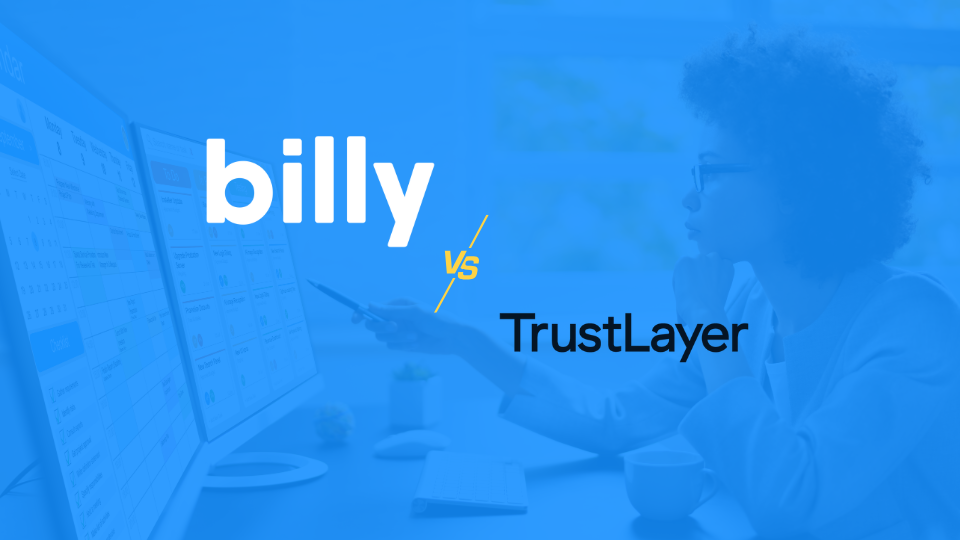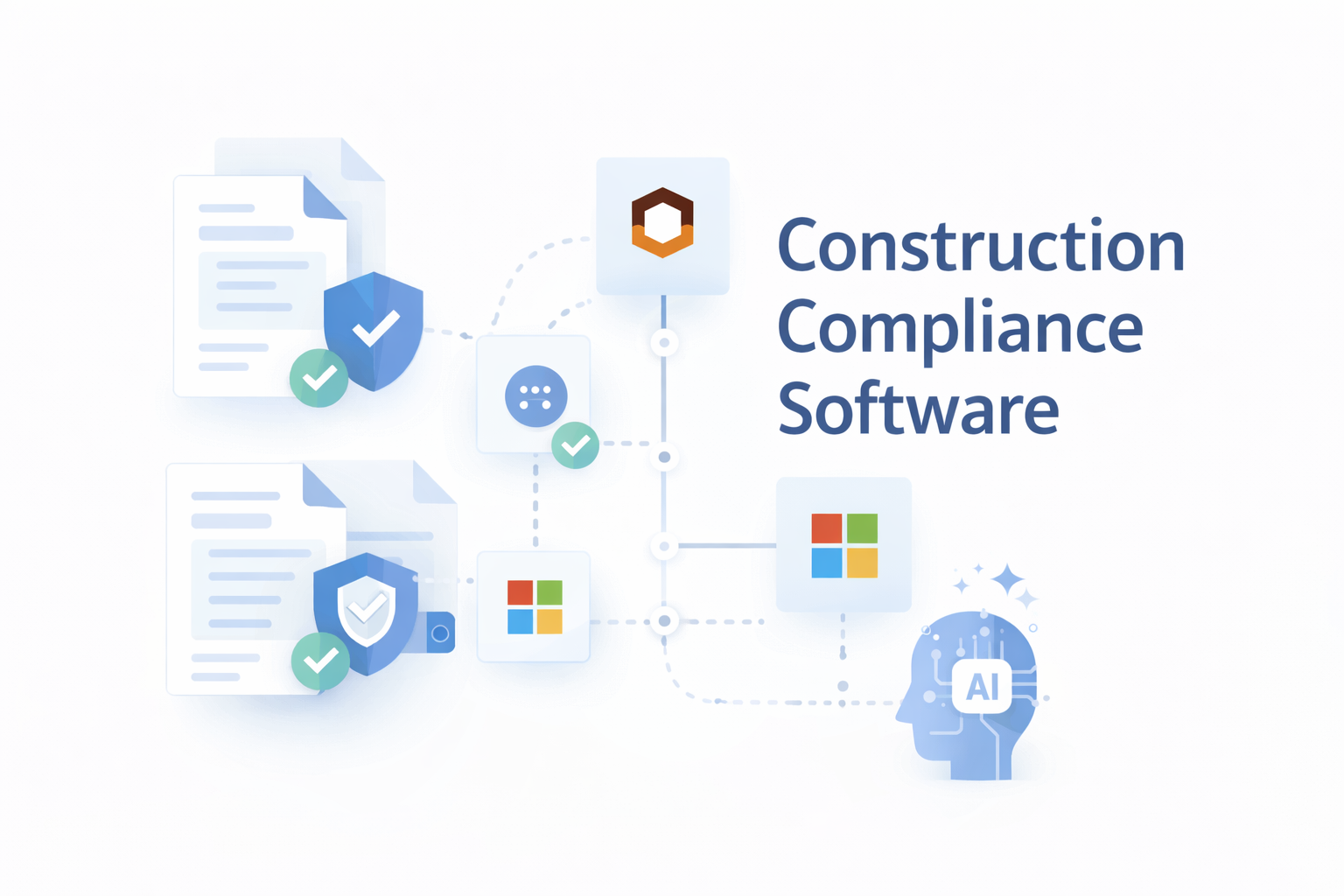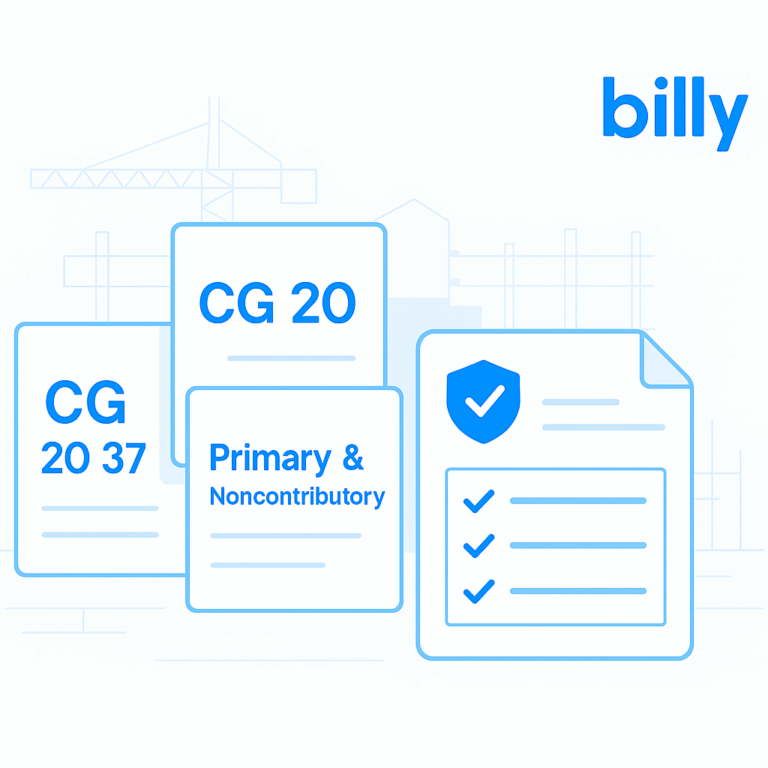As a contractor, staying on top of Certificates of Insurance is no easy feat. Handling them manually can quickly turn into a time-consuming task that distracts you from what truly matters—delivering projects on schedule and within budget. Luckily, automated solutions like TrustLayer and Billy are designed to make COI tracking easier and more efficient. But with so many options on the market, how do you choose the best compliance management software for your business?
Let’s take a deep dive into how TrustLayer and Billy compare, weighing their strengths and weaknesses, so you can make an informed decision about the best tool for streamlining your COI management. Whether you’re looking to automate workflows, improve compliance tracking, or boost subcontractor engagement, this comparison will help you understand the nuances of each platform and how they can meet your business’s unique needs.

The Importance of COI Management
COIs confirm that subcontractors and vendors have the necessary insurance coverage to protect all parties involved in a project. Manual COI tracking is time-consuming and prone to errors, making automation an essential tool for construction firms looking to reduce administrative burdens and improve compliance oversight.
Beyond reducing administrative work, automated COI management helps contractors avoid project delays caused by compliance issues, protects against liability risks, and ensures adherence to insurance requirements mandated by contracts and regulations. Without proper COI tracking, contractors may unknowingly work with uninsured or underinsured vendors, exposing themselves to financial and legal repercussions.
TrustLayer: A High-Level Overview
TrustLayer is a risk management platform that automates COI collection and verification. It integrates with platforms like Procore and PowerBI and uses AI-driven technology to assess compliance. Daily automated reminders help keep subcontractors accountable for missing or non-compliant COIs.
Strengths of TrustLayer:
- Automation: Reduces manual work by automatically verifying COIs against set requirements.
- Integrations: Works well with project management tools and analytics platforms.
- Compliance Notifications: Sends automated reminders to subcontractors for missing or non-compliant COIs.
Challenges of TrustLayer:
- Not Construction-Focused: TrustLayer’s platform serves multiple industries, which means it may lack the specialized features and focus needed for the construction sector.
- No Vendor Pre-Qualification: Unlike Billy, TrustLayer doesn’t offer vendor pre-qualification, which is crucial for ensuring subcontractors meet necessary requirements before starting a project.
- Lack of AI Features: TrustLayer doesn’t utilize AI to streamline processes and improve decision-making, a key differentiator for modern COI management tools like Billy.
- Fewer Integrations: TrustLayer offers fewer integrations compared to Billy, limiting the ability to connect seamlessly with other critical systems used in construction projects.
- User Adoption Issues: Some subcontractors struggle with engaging with the platform.
- Text-Heavy Interface: The platform’s text-heavy interface can make it difficult for subcontractors to quickly understand and submit their COIs.
- Limited Reporting Features: Users have expressed a need for weekly reports to track compliance trends.
- Subcontractor Compliance Issues: Some subcontractors fail to engage with the platform, requiring project managers to intervene manually.
- Communication Gaps: While automated reminders exist, there is no personalized or interactive support for subcontractors struggling with the process.
Billy: A Practical Alternative
Billy is designed specifically for the construction industry, offering a user-friendly approach to COI management. It simplifies compliance tracking by ensuring that insurance documents are collected, verified, and stored in one centralized location.
Strengths of Billy:
- Ease of Use: The platform is created to be straightforward and user-friendly, allowing subcontractors to easily submit COIs without any frustration.
- Automated Compliance Tracking: Billy eliminates the need for excessive manual follow-ups by streamlining document collection and verification.
- Seamless Integrations: Works with construction management tools like Procore and Autodesk Construction Cloud for a smoother workflow.
- Vendor Pre-Qualification: Billy’s robust vendor pre-qualification process ensures that all subcontractors meet necessary requirements before they begin working on a project, reducing risk from the start.
- Enhanced Reporting: Provides real-time compliance insights, helping contractors stay ahead of potential risks.
- Higher Subcontractor Engagement: Designed with a user-friendly interface, Billy encourages subcontractors to complete COI submissions promptly, reducing administrative headaches.
- Better Communication and Support: Billy emphasizes interactive compliance tracking with clear guidance for subcontractors, ensuring smoother processes.
How Billy Addresses Common Industry Challenges
Many contractors using other COI management solutions face obstacles such as subcontractor engagement, complex interfaces, and limited reporting. Billy tackles these issues by prioritizing usability and transparency, ensuring that compliance is maintained with minimal disruption to daily operations.
Billy offers features such as:
- Simplified COI Submission: Reducing unnecessary text-heavy instructions makes it easier for subcontractors to understand and complete their tasks.
- Customized Compliance Alerts: Rather than just sending automated reminders, Billy provides more detailed notifications to help subcontractors clearly understand what is missing and how to fix it.
- Real-Time Compliance Dashboards: Contractors can quickly check which vendors are compliant and which require follow-ups, reducing time spent chasing missing documents.

Choosing the Right COI Management Solution
Both TrustLayer and Billy offer automation to ease the burden of COI tracking, but the best compliance management software depends on what matters most to contractors and how they approach compliance management. The decision primarily depends on several key factors, including ease of use, automation features, reporting capabilities, and the overall effect on administrative workload. Here’s a deeper look at how each platform aligns with different contractor needs:
1. Ease of Use & Subcontractor Adoption
If you prioritize a user-friendly platform that promotes subcontractor adoption without requiring extensive training or follow-up, Billy stands out. With its simple and intuitive interface, Billy ensures subcontractors can easily submit their COIs with minimal effort. The user-friendly design of Billy encourages quick adoption, even from subcontractors who may not be tech-savvy, reducing the need for time-consuming training sessions.
In contrast, while TrustLayer offers automated reminders, some users have reported that subcontractors are slow to engage with the platform, making manual interventions necessary at times. For contractors looking to onboard subcontractors quickly and smoothly, Billy offers a seamless and frustration-free experience.
2. AI-Driven Compliance Verification
Both TrustLayer and Billy provide strong features to automate the collection, verification, and management of Certificates of Insurance (COIs). Both stand out with its use of AI-driven compliance verification, which helps assess whether a subcontractor’s insurance certificate meets the required criteria.
3. Reporting & Real-Time Compliance Tracking
If real-time reporting and detailed compliance tracking are crucial for your business, Billy is the more comprehensive solution. It offers advanced reporting features that provide real-time insights into your COI status across multiple subcontractors and vendors. These reports make it easier to track progress, identify potential risks, and ensure that you stay ahead of compliance deadlines.
For contractors who need an up-to-date view of their compliance landscape at all times, Billy’s reporting capabilities allow for proactive decision-making and minimize the risk of surprises. While TrustLayer provides compliance tracking, users have noted that its reporting features are relatively basic, often missing the granularity required for deeper insights.
4. Reducing Administrative Workload for Project Managers
For contractors looking to reduce the administrative burden on their project managers, Billy’s subcontractor-friendly design minimizes the need for manual intervention. With a platform designed to keep subcontractors engaged and provide them with clear instructions, Billy helps prevent the need for constant follow-ups. Project managers can count on Billy’s automation to manage the bulk of the work, from sending reminders to verifying documents. This means less time spent chasing down COIs or dealing with non-compliant submissions.
TrustLayer, while also automated, may require more manual involvement due to lower subcontractor engagement and more complex interface. If reducing the administrative workload for project managers is key to your decision, Billy’s focus on ease of use and subcontractor engagement offers a more streamlined, hands-off approach.
Making the Right Choice: Streamlining COI Management with Billy
COI management is essential for risk mitigation in construction, and automation is the key to efficiency. While both TrustLayer and Billy provide valuable features, contractors looking for a straightforward, effective, and contractor-friendly solution might find that Billy better suits their needs.
Unlike some other COI tracking solutions that may require significant involvement from project managers, Billy ensures subcontractors are actively engaged in the process. The platform’s emphasis on ease of use, improved communication, and real-time reporting gives contractors the visibility and control they need to maintain compliance without added frustration.
The right tool should not only ensure compliance but also enhance workflow efficiency—ultimately saving time, reducing risk, and improving project management. For construction firms looking for a solution that prioritizes usability, automation, and integration, Billy provides a robust and practical option.
Frequently Asked Questions
An effective compliance management system streamlines the process of monitoring, tracking, and ensuring that all legal and regulatory requirements are met. It helps organizations stay compliant with industry standards, reduces risk, and minimizes the chances of costly penalties by automating tasks like document collection, verification, and reporting.
The cost of compliance software varies depending on the features, number of users, and integrations offered. For Billy, pricing is tailored to the specific needs of the business. Schedule a free trial today to learn more!
Billy integrates seamlessly with popular construction management tools such as Procore, Autodesk Construction Cloud, and other project management platforms. These integrations allow for a smooth workflow, making it easier to manage compliance documents within existing systems.






